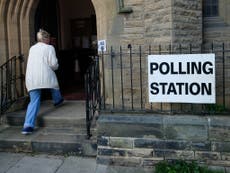The Tory manifesto is a sign of things to come – an elected dictator who will scrap our democracy
By, say, 2021, Boris Johnson will be free to just shut parliament down, for as long as he finds convenient. That really should frighten you. Don’t say he hasn’t tried to do it before

On page 48 of the Conservative manifesto for the general election, “Get Brexit Done. Unleash Britain’s Potential”, there are the following seemingly fair-sounding and innocuous words:
“After Brexit we also need to look at the broader aspects of our constitution: the relationship between the government, parliament and the courts; the functioning of the Royal prerogative; the role of the House of Lords; and access to justice for ordinary people. The ability of our security services to defend us against terrorism and organised crime is critical. We will update the Human Rights Act and administrative law to ensure that there is a proper balance between the rights of individuals, our vital national security and effective government.”
Do you know what? I think they’re going to scrap the remaining practical rights and prerogatives of the House of Commons in an act of spite. It will be all the better to allow a government with the support of about 40 per cent of the electorate, and, say, the positive support of a quarter of the adult citizens of the country to do what the hell it wants for five years without pause or interruption. Landslide or not, they will be able to behave as if they have untrammelled power.
It’s no secret that Boris Johnson and his allies deeply resented the speakership of John Bercow, and the democratic reforms he made to parliament that made it once again able to exercise its role as the seat of sovereignty in our constitution. The rules of the Commons, albeit some archaic, were used to frustrate, as Johnson would see it, Brexit, though in reality they were only aimed at permitting the Commons to have its own final say on a Brexit deal, and rule out no deal, and nothing more than that.
There were manoeuvres, using emergency debates (Standing Order 24 of the House of Commons’ rulebook), the ancient right to send a Humble Address to the Queen, taking control of the order paper (parliamentary agenda), and urgent questions. All were exercised by the Commons taking back control over the order of business of the house and making ministers accountable for their actions.
It would have been more difficult for the backbenchers concerned, dedicated parliamentarians such as Dominic Grieve, Hilary Benn and Oliver Letwin, to have done so without the support of Speaker Bercow. But Bercow was acting purely in the interests of the Commons itself – he was partisan in favour of the institution, which it was his job to defend and champion.
Well, the Johnson administration station, if elected, is going to stop all that malarkey. They will also – it is more or less explicit – interfere in the judiciary and restrict the powers of the Supreme Court to rule on issues such as the prorogation of parliament. There has been talk – not in this manifesto admittedly – of making the judges politically accountable, by being ratified via hearings by parliament, in the way they are in the United States. They have not forgiven Lady Hale and her colleagues for their ruling that the suspension of parliament in the autumn was unlawful, null and void. Neither would I be surprised if they pack the Lords with new and obedient Tory peers.
So there will be legislation to restrict the rights of the Commons itself, of the independent judiciary and maybe even the civil service to make sure that the next Tory government is not troubled by such interference, or what we know as the independent checks and balances of our constitution.
If the 2017-19 parliament saw the biggest attempt by the Commons to take back control in 300 plus years, then the one that starts in a few weeks will see the biggest power grab by the executive since Charles I tried it on. Whether speaker Lindsay Hoyle can withstand the wave of legislation being passed by toadying and pliant Tory MPs is hard to imagine, and the recent purge and the manifesto loyalty pledge has turned them into Johnsonite automatons – Hoyle simply hasn’t the powers to stop it.
The replacement of the Human Rights Act is another example of their contempt for, well, human rights – and it begs the question of whether the UK will, in fact, withdraw from the European convention itself.
You need to understand the real power of the manifesto commitment that a Johnson government will “ensure that judicial review is available to protect the rights of the individuals against an overbearing state, while ensuring that it is not abused to conduct politics by another means or to create needless delays”.
That, it might fairly be said, is the first hint of the forthcoming Gina Miller Revenge Bill, to go alongside the John Bercow (Reversal) Bill and the Enemies of the People and Spiderwoman (Baroness Hale) Reform Bill.
Of course, the Johnson government will go about this dismantling of judicial democratic protections through the time-honoured procedure of setting up a tame, “independent” body – a “Constitution, Democracy and Rights Commission” that “will examine these issues in-depth, and come up with proposals to restore trust in our institutions and in how our democracy operates”. I think you know what that means. A gang of trusties and patsies will be lined up to do what Johnson wants. I bet Bercow won’t be invited to get on board.
For the next few years, there will be a new but familiar because mantra that echoes the “will of the people” lines we have had since the 2016 referendum. The Tories got a mandate; the people have spoken; they can do as they wish; the manifesto is sacred; it means what we want it to mean; no pretentious metropolitan elite is going to be permitted to chuck spanners in the works again.
The prime ministerial prerogative to hold a general election when it can best be won by rigging it – through tax cuts and an artificial economic boom – will be restored through the repeal of the Fixed-term Parliament Act. The Tories will be the beneficiaries of yet another unfair advantage. No more will a troublesome “zombie parliament” daring to stand up for its rights obstruct minsters who now lack the popular support to get Brexit done or whatever other scheme they have in hand.
By, say, 2021, Boris Johnson will be free to just shut parliament down, for as long as he finds convenient. That really should frighten you. Don’t say he hasn’t tried to do it before.
And just to make sure the next election is properly skewed in their favour, the Conservatives will spend £14m on fixing the virtually non-existent problem of voter ID fraud in Britain. This, there is little doubt, is a direct lift from the tricks the Republicans have played at state level in the US, with the right to vote and suppression of the franchise aimed at the poor and minorities. That too will be coming and there is no chance that it can be taken to judicial review either, or changed under human rights legislation that will be radically weakened.
These overlooked paragraphs in the manifesto, then, amount to an assault on your rights. They are not quite the arid constitutional arguments they might seem, and nowhere near as balanced and reasonable-sounding as they appear. The thing that we all ought to have learned by now is that you cannot trust these Tories to tell you the truth about anything. But there is enough there for us to read between the lines.
We are headed for what a Conservative statesman of a previous generation, Lord Hailsham, famously called an “elective dictatorship”. The Johnson government, more than most, would like to pass whatever bills it likes when it likes, with the Commons confined to being a rubber stamp. The Commons will only have the ultimate power of a vote of no confidence available to it – a deterrent so powerful it would bring down a government, and is therefore useless in trying to do what parliament wants them to do day-to-day.
What are the chances, do you suppose, that we will see the powers of the Electoral Commission strengthened? For social media and new forms of communication to be fairly regulated? To curb the epidemic of “fake news”? To control party funding and donations from foreign or shady corporates and individuals? To guard against foreign meddling and manipulation? Not a word of such things in the Tory manifesto, apart from one vague commitment about interference. And you wonder why?
Prime Minister Johnson will be presidential, if not dictatorial; able to control everything, adding these new powers to his already comprehensive hold on patronage, public spending, taxation and the rest. There is something obvious you can do about it on 12 December, but after that, maybe not.





Join our commenting forum
Join thought-provoking conversations, follow other Independent readers and see their replies